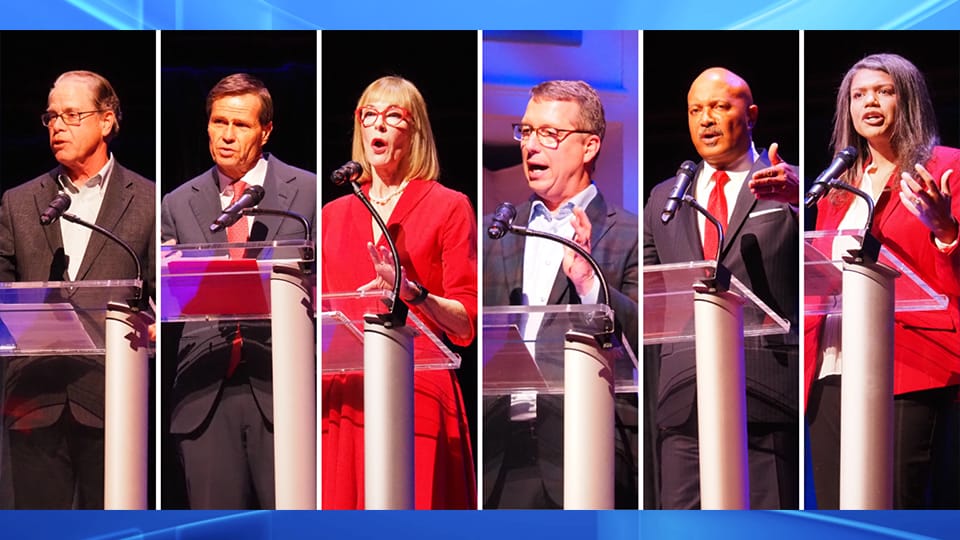GOP gubernatorial hopefuls talk Indiana’s dormant death penalty
Subscriber Benefit
As a subscriber you can listen to articles at work, in the car, or while you work out. Subscribe Now
Indiana’s death penalty law exists in name only. What would Indiana’s GOP candidates for governor do differently?
In recent years some public defenders have suggested it’s time to repeal the law, which hasn’t been used to execute someone since 2009. That’s because Indiana — along with other states — has struggled to obtain the drugs necessary to carry out a lethal injection.
Alabama recently carried out the nation’s first execution by nitrogen hypoxia. An AP reporter who viewed the execution described Kenneth Smith thrashing and gasping as prison officials administered the gas. Ohio is considering adding the new method to its law.
None of the six candidates immediately backed changing methods. They spoke mostly in generalities.
“I don’t think it’s time to get rid of the death penalty. I believe in it. I support it in the sense that there are certain levels of crime in our code that they require, they call for the death penalty. I think it’s necessary in that sense,” said Curtis Hill, a former state attorney general.
But he said it has become “somewhat irrelevant” because procedural issues cause cases to linger too long.
“That’s a pretty good incentive, if you will, for staying away from major crimes of that nature. If you have a crime today and it takes 20 years to carry out the sentence — it definitely doesn’t become as important in our current justice system as it would have been had the sentence been carried out more quickly,” Hill said.
Indiana has eight men on Death Row and at least four of them have exhausted all their appeals. One man has been waiting 31 years. But the Indiana Department of Correction (DOC) doesn’t have the three drugs it would use for the lethal injection cocktail: methohexital, pancuronium bromide and potassium chloride.
There also are fewer death penalty cases making it through the system, partly due to cost. Four death penalty cases statewide are pending trial, according to the Indiana Public Defender Council. No one new has been added to Death Row since 2014.
Lt. Gov. Suzanne Crouch said she would direct the DOC to “redouble its efforts to find the required drugs or other appropriate drugs to carry out these sentences.”
And she said any change in execution method should be done in consultation with medical and public safety experts and the General Assembly.
“If they recommend a change in the execution method to me as governor, I would consider their proposal,” Crouch said.
U.S. Sen. Mike Braun said he would consider input from federal authorities and other states in addition to health experts but that “When used, the death penalty should be swift and painless.
“All life is precious, and the death sentence is a very serious penalty reserved for those guilty of the most heinous of crimes. I trust Hoosier jurors and judges to understand the gravity of the sentence and hand it down when appropriate,” he said.
Pro-life?
Both Crouch and Hill are staunch anti-abortion advocates but distinguished their beliefs on life.
“A human being growing and living in a mother’s womb is innocent life; a person convicted of a capital offense does not represent innocent life. I will always stand for the protection of innocent life,” Crouch said.
Hill said the death penalty involves a person who has forfeited their right to life based on an egregious act determined in a court of law.
“There’s no comparison between a convicted murderer who was found to have committed aggravated circumstances and an unborn child who requires some protection,” Hill said.
Eric Doden, a Fort Wayne businessman also seeking the governorship, said he “would continue to work with other states and stakeholders to enforce Indiana’s laws through whatever legal means or methods available.”
And he differentiated his pro-life views by saying “America is built on a bedrock commitment to law and order. Upholding that commitment and protecting our most vulnerable citizens means accountability through our justice system, including capital punishment in the most heinous cases.”
Candidate Brad Chambers was sent three questions on the death penalty but only responded with, “It’ll be my obligation as governor to enforce state law as written. If the state can carry out executions as the law provides, we’ll do so.”
The devout Jamie Reitenour shared the story of Jesus on the cross when asked about the death penalty, saying that when the two thieves next to him talked about getting down, he offered “eternal hope” after death to those willing, rather than releasing them.
“… a baby hasn’t done anything wrong, so I kind of put those two in separate categories,” she responded when asked about how her anti-abortion beliefs squared with her position on the death penalty.
“… I would just say that the death penalty is super, super rare — it should be. But in the cases where it needs to apply, the judges have weighed in on that and I would not be a person that would interfere with that,” she concluded.
The Indiana Capital Chronicle is an independent, not-for-profit news organization that covers state government, policy and elections.
